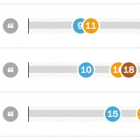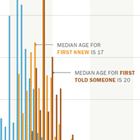Before we launched our first major effort to capture the views and opinions of LGBT adults for our series ‘LGBT in Changing Times,’ we convened a focus group to help inform our approach. In March 2013, we assembled 12 LGBT adults from the Washington, D.C. area: five gay men, three transgender adults, two bisexual men and two lesbians. We asked them about being LGBT in America today.
This is not the first time we’ve used focus groups in our research. We convened focus groups for our recently published report on teens, social media and privacy. And in 2009, we used focus groups with our research about Latino youth. Focus groups help us identify the best questions to ask in a survey and to understand a community’s views better. Here’s a sample of quotes from our LGBT focus group discussion. You can read more voices from the LGBT community we surveyed and add your own in the comments section.
What do you consider yourself to be? How do you see your identity?
[about me as]
[age]
I’m lesbian. Growing up, I didn’t know what it was, all I knew was I saw those rough women that drank too much and stumbled around and no one liked them and they called them “bulldaggers” and no one wanted to be a “bulldagger,” so when I finally found my voice and realized that it was okay, you know, I’m okay. I’m a lesbian all the way, and I love it. I do look at some guys and go like ‘he’s cute,’ and my friends do say I have a little gay man inside of me when it comes to fashion and things like that, but I’m lesbian. 43-year-old lesbian
[because of]
[our son]
[I have]
[Washington]
Overall, are you satisfied or dissatisfied with the level of social acceptance for gay, lesbian, bisexual and transgender adults in the country today?
[with the progress]
[have]
[taking up a gay marriage case]
[it still exists]

LGBT Voices: The Coming Out Experience Scroll through hundreds of responses to the question: How has the process of telling people about your sexual orientation/gender identity been for you personally?

Charts: Personal Milestones in the Coming Out Experience See charts plotting three key points in the coming out journey: How old respondents were when they first thought, knew fore sure and told someone they were something other than straight or heterosexual.
